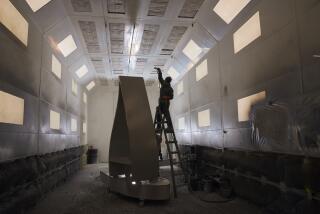Dress Less for Success : Hi-Tech Consulting Firm in Ojai Mixes Fun and Profit
- Share via
Rick Sands didn’t take it literally when the people at EcoAnalysis, a consulting firm in Ojai, told him to dress casually for a job interview.
Sands, then a computer programmer at the headquarters of a humongous defense contractor, had spent 10 years working by the white-shirt-and-necktie rules of the corporate world. To him, “casual” meant taking his suit jacket off.
During the interview, Sands learned the EcoAnalysis definition of the word.
“I’m the one who had the tie on,” Sands recalled. “The rest were wearing T-shirts and shorts.” Company President Bob Smith was barefoot.
Sands was hired and quickly followed suit by discarding his. Now he wears shorts and a T-shirt to the office. He often pads around the office in his bare feet, and a braided ponytail dangles well down his back. The firm is a good place to work, Sands said, unless “you’re someone who wants to wear a tie and hard shoes all day.”
It’s a running joke at EcoAnalysis, a collection of scientists and programmers who work upstairs from the Serendipity toy store. Job applicants are invariably better dressed than the company’s four owners, who often look as if they are about to sprint out the door for a 5K. Sometimes they do.
But if their appearance is casual, their attitude is not.
“We look laid-back, but we work our butts off,” said co-owner Brock Bernstein, who once sat on the floor to conduct a job interview.
EcoAnalysis helps companies deal with the welter of environmental regulations. Its clients include California’s biggest utility companies and many city, county and state agencies.
“We work for the polluters in a lot of cases,” said Smith, a noted marine biologist.
The company designs computer programs that bring together and analyze huge amounts of information, in effect helping their clients see the forest for a million trees of data. Co-owner David Guggenheim said he likes one friend’s description of EcoAnalysis as an “information factory.”
Working with Southern California Edison Co. and UCLA, EcoAnalysis has designed software that will sift through the death certificates of all Edison workers who died within the past 25 years.
The data will be used to analyze the health effects of electromagnetic fields from high-voltage lines. Some researchers believe that prolonged exposure can cause cancer.
EcoAnalysis designed Toxis for the state Water Resources Control Board. Toxis is a program that standardizes the way dischargers, such as municipal sewage plants, refineries and pulp mills, monitor the toxicity of the effluent that they release into California’s oceans, rivers and ground-water systems. The tests are required for pollution controls.
“There are a lot of valid complaints about environmental regulations, that they are costly and inefficient,” Smith said. “Instead of throwing the baby out with the bathwater, we’re trying to find ways of making things better and cheaper and to help people get more bang for the buck.”
With its high concentration of professional jobs, EcoAnalysis is an unusual company in Ojai, a New Age capital better known for its psychics and crystals than scientific research. Five of the firm’s 27 employees are Ph.D.s, and four have master’s degrees in such fields as marine biology, computer science, epidemiology and policy analysis.
The wide range of skills is one of the firm’s selling points.
“Their technical expertise is similar to other consulting firms, but the thing that I appreciate the most about EcoAnalysis is their ability to look at a problem and see a number of solutions,” said Jack Sahl, manager of occupational research at SCE.
Until the recession, EcoAnalysis was growing about 20% per year. This year, it will gross nearly $2 million, Smith said. Yet it is largely unknown in Ojai.
“We don’t produce any toxic wastes. We’re not noisy and we don’t smell bad,” joked Guggenheim.
EcoAnalysis seems to base its corporate philosophy on the “Just Do It” Nike advertisements.
Its board of directors--co-owners Smith, Bernstein, Guggenheim, and Rick Packard--cite the typical corporate goals of boosting profits, expanding staff and furthering research. But they add a more unusual goal: winning triathlons.
Three of the four are triathletes who run every day and get together for weekend bicycle rides of 50 or 60 miles.
Bernstein, who isn’t, is no couch potato. He plays basketball and has been a competitive swimmer.
The fitness ethic is so strong that instead of health insurance or paid vacations, EcoAnalysis employees get a corporate membership at the Ojai Valley Racquet Club. Many compete on Ojai’s Masters Swim Team.
The firm promotes exercise as a means of counteracting the sometimes intense stress of work, Guggenheim said.
“Here they really promote you to go out and be an athlete. They make me go out and run with them,” said programmer Karen Haines.
That’s only slightly exaggerated, Packard said.
“We don’t force anybody to (run), but we talk about it so much it’s hard not to get caught up in it,” he said. Packard has something to talk about. Last month, he placed 20th in the 40-to-44 age group at the national triathlon championships in Las Vegas.
EcoAnalysis is unconventional in other ways as well. Employees come and go as they please, as long as they get their work done.
When it comes time for employee reviews, staff members get to evaluate their bosses as well.
The four owners make all decisions by consensus, which sometimes means long and contentious board meetings.
“We’re scientists trying to be businessmen,” Guggenheim said.
The company has added new employee benefits every year. It now offers six paid holidays, a retirement plan and a profit-sharing plan. They hope to soon add health insurance and paid vacations, Smith said.
Heidi Myers, a computer programmer, said flextime is “heaven sent” for employees like her who have children. She said it makes up for the lack of paid vacations.
“I worked in the old time-clock environment where you had to wear nylons and all that,” said Myers, who came to EcoAnalysis from a defense contractor in Camarillo. “I had to be there at 8 and punch out at 5. Here you set your own hours.”
Like the staff, the offices are far from dressy. But the firm has seen worse.
Smith founded EcoAnalysis 15 years ago in the bedroom of his Redondo Beach home before his wife finally kicked him out into the garage.
In 1981, the Smiths found a new home, and EcoAnalysis a new garage, when they drove through Ojai and fell in love with its setting. Bob later used the scenery to seduce the other three co-owners into joining the firm.
Soon, nine employees were crowded in Smith’s garage. They fought for space among the plywood sheets that were nailed to the walls as desks. The place was so hot that they worked barefoot and left the garage door up for air circulation.
“When the Santa Anas came along, the leaves and the dust would all blow in,” said Guggenheim. “It was a real mess.”
Bob’s wife, Posy, didn’t like the new arrangement much better than the old.
“We used to put our lunches in her refrigerator,” Bernstein said.
That era ended after a city inspector snapped pictures of the EcoAnalysis staff sweating in the garage like a bunch of over-educated mechanics. The city cited the firm for running a business in a residential neighborhood, and EcoAnalysis was forced to find real offices.
Like their surroundings, their work started humbly.
The four were so desperate at first that they scrounged up whatever local business they could find. They designed accounting programs for a florist and a man who sold baseball cards. They set up an Amway-type marketing scheme for a vitamins peddler. It was not the type of science they had been trained to do.
Worst of all, Guggenheim said, “we lost money on every single one.”
Now, their research is published in professional journals, and their reputation is growing.
“Our goal is to grow at a rate where we can maintain our culture and our way of business,” Bernstein said.
And to maintain their quirky sense of humor.
Heidi Myers was the chief architect of a new piece of software, designed by EcoAnalysis and Southern California Edison, that manages employee drug-testing programs for large corporations.
EcoAnalysis has high hopes for the product. But when it was ready to market, Myers and the developers ran into a problem. They couldn’t think of a good name, one that was short and distinctive.
Guggenheim finally came up with the perfect solution.
They named it “Heidi.”
More to Read
Inside the business of entertainment
The Wide Shot brings you news, analysis and insights on everything from streaming wars to production — and what it all means for the future.
You may occasionally receive promotional content from the Los Angeles Times.










